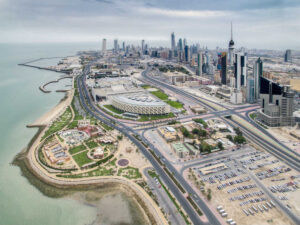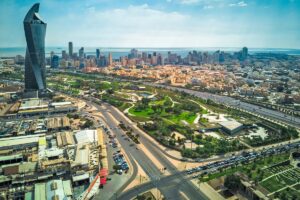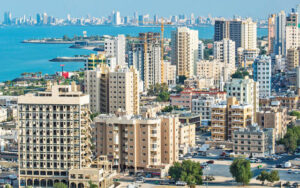Overview of Property Ownership in Kuwait
Foreigners interested in investing in Kuwait’s real estate market should understand the country’s property ownership regulations and restrictions. Here are some key points to keep in mind:
- Legal Restrictions: Foreign nationals face certain legal restrictions regarding property ownership and sale in Kuwait. For example, they are generally prohibited from owning land and can only purchase apartments or commercial properties in designated areas.
- Reciprocity Agreements: Kuwait has reciprocity agreements with some countries, allowing their citizens to own property in Kuwait. However, this can vary depending on bilateral agreements.
- Restricted Zones: Foreigners are generally prohibited from acquiring properties in some regions of Kuwait, such as military zones and areas close to the border with Iraq.
- Investment Opportunities: Despite the legal restrictions and limitations, Kuwait’s real estate market still offers investment opportunities for foreigners. Some designated areas where foreigners can purchase properties include Abu Al Hasaniah, Al Shaab Al Bahri, Bneid Al Gar, Salwa, and Salmiya.
- Economic Climate: Kuwait’s real estate market is heavily influenced by the country’s economic climate.
- Regulations and Procedures: Foreigners who wish to purchase property in Kuwait must follow specific rules and procedures. For example, they must obtain approval from the Ministry of Interior and pay various fees and taxes.
Overall, while there are legal restrictions on property ownership for foreigners in Kuwait, there are still opportunities for investment in designated areas. Understanding the regulations and procedures involved is crucial for anyone interested in investing in Kuwait’s real estate market.
Legal Framework for Foreign Property Investment
Foreign nationals in Kuwait face certain legal restrictions regarding property ownership and sale. However, some legal frameworks allow foreign property investment in some regions of the country. Here is an overview of Kuwait’s legal framework for foreign property investment.
Government Regulations and Restrictions
The Real Estate Ownership Law (Law No. 74 of 1979) prevents foreign individuals and entities from obtaining real estate ownership in Kuwait. However, there are some designated areas where foreigners are allowed to purchase apartments or commercial properties. These designated areas include Abu Al Hasaniah, Al Shaab Al Bahri, Bneid Al Gar, Salwa, and Salmiya.
Eligibility and Residency Requirements
Foreigners investing in Kuwait properties must meet specific eligibility and residency requirements. They must have a valid passport and a residency permit and be over 21. They must also have a clean criminal record and be able to provide proof of their financial stability.
Compliance and Due Diligence
Foreign property investors in Kuwait must comply with all relevant laws and regulations. They must conduct due diligence on the property they wish to invest in and ensure that all necessary approvals are received before proceeding with the transaction. They must also be aware of any restrictions or limitations that may apply to their investment.
In conclusion, while some legal restrictions exist on foreign property investment in Kuwait, legal frameworks also allow for investment in certain designated areas. Foreign investors must abide by all applicable rules and regulations and conduct due diligence to protect their investment.

Understanding the Kuwaiti Real Estate Market
Economic Factors Influencing the Market
The country’s economy heavily influences the Kuwaiti real estate market. Economic growth, local economy, and investment opportunities are critical factors affecting the market. The oil industry is the primary driver of the Kuwaiti economy, and oil price fluctuations can significantly impact the real estate market.
Areas Open to Foreign Investment
Foreigners are restricted from buying land in Kuwait but can purchase apartments or commercial properties in designated areas. These areas include Abu Al Hasaniah, Al Shaab Al Bahri, Bneid Al Gar, Salwa, and Salmiya. It is important to note that foreigners are generally prohibited from buying properties in restricted zones.
Market Trends and Investment Opportunities
The Kuwaiti real estate market has seen a steady increase in property demand in recent years. The market is expected to continue growing, with investment opportunities available in various sectors. The commercial industry is beautiful to investors, with a high demand for office and retail spaces. The residential sector also presents investment opportunities, with a growing demand for high-end properties in Kuwait City.
In summary, the Kuwaiti real estate market is heavily influenced by economic factors, with investment opportunities available in various sectors. Foreigners are restricted from buying land but can purchase apartments or commercial properties in designated areas. The commercial industry is beautiful to investors, with a high demand for office and retail spaces. The residential sector also presents investment opportunities, with a growing demand for high-end properties in Kuwait City.
The Process of Buying Property in Kuwait
Foreigners can buy real estate in Kuwait under certain conditions. However, purchasing property in Kuwait can be complex and involves several legal and financial considerations. Here are some things to keep in mind when purchasing property in Kuwait:
Finding Properties and Working with Agents
- Foreigners looking to buy property in Kuwait can start by contacting local real estate agents who can help them find properties.
- Foreigners can search for properties online through various real estate websites and portals.
Navigating the Buying Process
- Once a foreigner has identified a property they want to buy, they must make an offer to the seller.
- To secure the home, the buyer must provide a deposit of about 10% of the total cost.
- The buyer must also obtain a no-objection certificate (NOC) from the Kuwaiti government, confirming they can buy the property.
- After obtaining the NOC, the buyer must pay the remaining purchase price balance and register the property with the Kuwaiti government.
Legal and Financial Considerations
- Foreigners buying property in Kuwait may face certain legal restrictions and need approval from the Kuwaiti government before purchasing property.
- Foreigners may also need to pay legal fees and taxes, such as registration fees and stamp duty when buying property in Kuwait.
- Financing options for foreigners buying property in Kuwait may be limited, and interest rates may be higher than those offered to local buyers.
- Foreigners may be subject to income tax on rental income earned from their property in Kuwait.
- Foreigners buying property in Kuwait may need to work with local banks to obtain financing and provide additional documentation.
In summary, buying property in Kuwait as a foreigner involves several legal and financial considerations, and it’s essential to work with reputable agents and lawyers to navigate the process.

Types of Properties Available to Foreigners
Foreigners are allowed to purchase certain types of properties in Kuwait, but there are restrictions on land ownership. Here are some of the properties that are available to foreigners:
Residential Properties
Foreigners may purchase apartments in Kuwait but need help owning land. It is important to note that buying property in Kuwait can be complex, especially for expats. Therefore, it is recommended that foreigners seek the assistance of a professional agent or lawyer to guide them through the process.
Commercial Properties
Foreigners are also allowed to purchase commercial properties in Kuwait. This includes office spaces, warehouses, and retail stores. However, it is essential to note that purchasing commercial properties can be more complex than buying residential properties.
Designated Areas for Foreign Ownership
Foreigners are allowed to purchase properties in designated areas in Kuwait. These areas include Abu Al Hasaniah, Al Shaab Al Bahri, Bneid Al Gar, Salwa, and Salmiya. It is important to note that the availability of properties in these areas may vary, and the prices may be higher than in other regions of Kuwait.
Some key points to keep in mind when considering purchasing property in Kuwait include:
- Foreigners cannot own land in Kuwait; they can purchase apartments and commercial properties.
- Designated areas for foreign ownership include Abu Al Hasaniah, Al Shaab Al Bahri, Bneid Al Gar, Salwa, and Salmiya.
- The availability of properties in these areas may vary, and the prices may be higher than in other regions of Kuwait.

Living in Kuwait as a Property Owner
Congratulations if you are a foreigner who has successfully purchased a property in Kuwait! Here are some things to remember as you begin your new life as a property owner in Kuwait.
Cost of Living and Expenses
Living in Kuwait can be expensive, but as a property owner, you have the advantage of not having to pay rent. However, other living expenses, such as utilities, groceries, and transportation, remain to be considered. The cost of living in Kuwait is generally higher than in other Middle Eastern countries but still lower than in many Western countries.
Lifestyle and Amenities
Kuwait offers a unique lifestyle that is a blend of traditional and modern. As an expat and property owner, you can access various amenities, including air conditioning, swimming pools, and other modern conveniences. However, it is essential to note that some neighborhoods may be more conservative than others, so it is necessary to research the area before deciding.
Community and Neighborhoods
One of the benefits of owning a property in Kuwait is the opportunity to become part of a local community. Kuwait is known for its friendly and welcoming locals, and as a property owner, you will have the chance to build relationships with your neighbors. When choosing a neighborhood, consider factors such as proximity to amenities, safety, and the overall feel of the community.
- As an expat and property owner, you can access modern amenities like air conditioning and swimming pools.
- The cost of living in Kuwait is generally higher than in other Middle Eastern countries but lower than in many Western countries.
- When choosing a neighborhood, consider factors such as proximity to amenities, safety, and the overall feel of the community.
Mortgages and Financing for Expats
Foreign nationals interested in investing in Kuwait’s real estate market have a few financing options. Here are some key points to keep in mind:
- Expats can apply for mortgages from local banks in Kuwait.
- Non-Kuwaitis can obtain mortgages for up to 70% of the property value, with the remaining 30% required as a down payment.
- Interest rates for expat mortgages vary depending on the bank and loan terms.
- Expats should know that some banks may require a minimum salary or length of residency in Kuwait to qualify for a mortgage.
- It is essential to compare different mortgage options and interest rates before deciding on a lender.
Foreign nationals can also explore financing options outside of Kuwait, such as international banks. However, it is essential to note that these options may come with higher interest rates and stricter eligibility requirements.
Overall, expats interested in purchasing property in Kuwait should carefully consider their financing options and choose a lender that best fits their needs and financial situation.

Essential Considerations for Foreign Investors
Foreign investors looking to invest in Kuwait’s real estate market must consider certain important factors before making investment decisions. Here are some of the critical factors that foreign investors should keep in mind:
Evaluating Investment Risks
Kuwait’s real estate market has specific risks, like any other investment opportunity. Some of the risks that foreign investors should evaluate before investing in Kuwait’s real estate market include:
- Economic Growth: Kuwait’s economy has been growing steadily, but evaluating its economic outlook before investing in its real estate market is essential.
- War: The Middle East is volatile, and there is always a risk of war breaking out in the region. Foreign investors should evaluate the risk of war before investing in Kuwait’s real estate market.
- Currency Risk: The Kuwaiti Dinar is Kuwait’s official currency, and foreign investors should evaluate the currency risk before investing in the country’s real estate market.
Understanding Local Customs and Practices
Foreign investors should also know local customs and practices before investing in Kuwait’s real estate market. Some of the customs and practices that foreign investors should be aware of include:
- Iqama: Foreign investors should be aware of the Iqama system in Kuwait, which is a residency permit that allows foreigners to live and work in the country.
- Legal Restrictions: Non-Kuwaitis can only own land or property in designated areas and must obtain a special permit from the Ministry of Interior before purchasing.
- Building Regulations: Foreign investors should be aware of the building regulations in Kuwait before investing in the country’s real estate market.
Building a Support Network
Finally, foreign investors should build a support network before investing in Kuwait’s real estate market. Some of the critical stakeholders that foreign investors should build relationships with include:
- Real Estate Agents: Foreign investors should work with reputable agents who deeply understand the local market.
- Lawyers: Foreign investors should work with lawyers familiar with local laws and regulations.
- Local Contacts: Foreign investors must also cultivate connections with locals who may offer insightful information on the regional market.
Foreign investors can make informed decisions when investing in Kuwait’s real estate market by evaluating investment risks, understanding local customs and practices, and building a support network.
Specific Areas of Interest for Foreign Buyers
Foreigners can buy apartments or commercial properties in designated areas in Kuwait. These areas include Abu Al Hasaniah, Al Shaab Al Bahri, Bneid Al Gar, Salwa, Salmiya, Fintas, Mangaf, and Ahmadi. This section will highlight some areas that may interest foreign buyers.
Salmiya: A Popular Expat District
Salmiya is a famous district among expatriates due to its central location and vibrant atmosphere. It is home to many shops, restaurants, and cafes, making it an ideal place for those who want to live in a lively and bustling area. Salmiya is also close to the beach, making it a great place to enjoy the sea breeze and stroll along the coast. Foreigners looking to buy property in Salmiya can expect to find a range of apartments and commercial properties.
Fintas and Mangaf: Coastal Living
Fintas and Mangaf are located along the coast and offer a more relaxed and tranquil lifestyle. These areas are popular among those who enjoy coastal living and want to be near the beach. Foreigners looking to buy property in Fintas and Mangaf can expect to find various apartments and villas. These areas are also close to several international schools, making them an ideal location for families.
Ahmadi: Residential and Family-Friendly
Ahmadi is a well-liked residential neighborhood with a family-friendly vibe. It is the perfect place for those with kids because it has a lot of parks, playgrounds, and community centers. Ahmadi is also close to several international schools, making it ideal for families with school-going children. Foreigners looking to buy property in Ahmadi can expect to find a range of villas and apartments.
Overall, foreigners looking to buy property in Kuwait have several options. They can find properties that suit their needs and preferences by focusing on the areas designated for foreign ownership.
Kuwait MLS
Embark on an adventure into luxury real estate, where exceptional properties entice discerning buyers. Delve into Kuwait MLS, a platform abundant with listings and insights tailored to empower real estate professionals. Polish your sales strategy as you navigate this landscape of opportunities, with each property as a stepping stone toward your success.

Frequently Asked Questions
What are the legal requirements for expatriates purchasing property in Kuwait?
- Non-Kuwaiti nationals can only own land or property in designated areas, which include Abu Al Hasaniah, Al Shaab Al Bahri, Bneid Al Gar, Salwa, and Salmiya.
- Expatriates must obtain a special permit from the Ministry of Interior before purchasing.
- Expatriates must have a valid residence visa and a no-objection certificate from the bank if they are financing the purchase.
Are there any restrictions on the type of property foreigners can own in Kuwait?
- Non-Kuwaiti nationals can buy apartments or commercial properties in designated areas.
- Expatriates are generally prohibited from owning land in Kuwait.
What is the process for an international buyer to acquire real estate in Kuwait?
- The first step is to obtain a special permit from the Ministry of Interior.
- Once the permit is obtained, the buyer can search for properties in designated areas.
- The buyer must have a valid residence visa and a no-objection certificate from the bank if they are financing the purchase.
- The buyer must also ensure that the property has a clear title deed and that the seller provides a sale agreement.
Do expatriates have the right to own land in Kuwait?
- No, only Kuwaiti citizens can purchase land in Kuwait.
What are the financial implications for foreigners buying property in Kuwait?
- The cost of real estate in Kuwait varies depending on the location and type of property.
- Expatriates must pay a 1% real estate registration fee, a 1% real estate transfer fee, and a 5% stamp duty on the purchase price.
- Expatriates must also pay an annual property tax calculated based on the property’s rental value.
Can non-Kuwaiti residents obtain mortgages or property financing in Kuwait?
- Yes, non-Kuwaiti residents can obtain mortgages or property financing in Kuwait.
- However, they must have a valid residence visa and a no-objection certificate from the bank.












